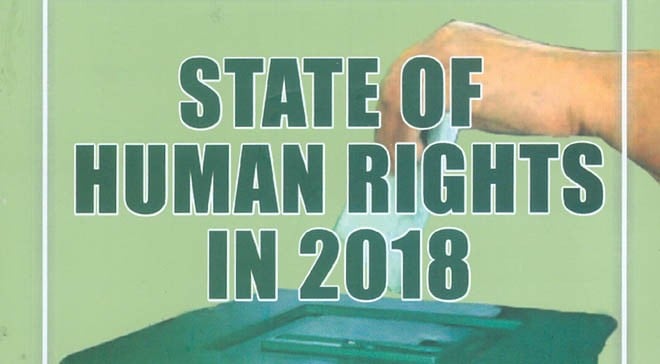
The HRCP’s annual report once again offers the most detailed available human rights record of the year

As it has done for almost three decades, Human Rights Commission of Pakistan’s annual report State of Human Rights in Pakistan 2018 carefully puts together details of human rights abuses in various categories across the country. The document is an invaluable one for all researchers, looking into issues of rights abuse or attempts to curb basic freedoms available to citizens. In fact, no similar document by an independent body exists in the country and the report is therefore of special significance to activists and researchers inside and outside the country, narrating stories through the human rights perspective.
This year is no different. Divided into six sections which include Rule of Law, Enforcement of Law, Fundamental Freedoms, Democratic Development, Rights of the Disadvantaged, and Social and Economic Rights, the document is further subdivided into various chapters which cover events falling under each of these spheres.
Over the years, the report has gradually increased in detail and the 2018 addition comprises of 358 pages with recommendations falling in line with international human rights conventions included at the end of each chapter. There are weaknesses in the report. It suffers from the lack of statistical detail available in Pakistan on all issues, including those related to human development or the rights of vulnerable groups. This means it is essentially reliant on the existing official data, reports, media news stories and other sources to put together its figures. There is always the possibility that some cases go unenumerated. For instance, the figures on honour crimes against women or the sexual abuse of children may present only the tip of the iceberg. The report itself states this clearly and by doing so points to a need for better documentation of all the events occurring in Pakistan.
For 2018, the focus is on the election in July 2018 and its outcome is naturally a focus of attention. Based on reports from HRCP correspondents and those monitoring elections, the restrictions on media coverage in the run-up to the polls are noted as one of the instances of checks on free expression in the country. The increase in curbs on the social media is also recorded in the report. So are many other details including those concerning lawmaking, the continued problem of enforced disappearances, the administration of the death penalty, the overcrowding and other problems in jails as well as the state of fundamental freedoms enshrined in the constitution, such as the right to association, the right to movement, the right to expression and the right to belief.
The right to belief is of course an especially troubled issue in Pakistan, with the release of Aasia Bibi in October 2018 leading to protests across the country. The putting together of such details and carefully organised sections makes the task of future researchers a far easier one than would otherwise have been possible.
Apart from issues such as education and health, which in some ways form the foundation on which the lives of people are built, the annual report for 2018 explores in more detail than past reports the situation for Pakistan’s elderly, its disabled and others who are in some way discriminated against or deprived of constitutional rights.
Positive changes too are noted, such as a slight improvement in lawmaking, with 39 laws passed by the National Assembly in 2018 as compared to 34 in 2017, and the increased attention given to conditions for transgender persons in terms of employment and access to rights as citizens. The passage of important laws, such as the Juvenile Justice System Act of 2018, replacing the ordinance for the same purpose of 2000, are recorded.
The annual report of the HRCP which draws immediate attention in the media and at human rights forums in the country and around the world is not an easy read. Many of the details are harrowing and the overall portrait of the country that emerges in terms of its human rights record is a distinctly ugly one. All citizens should be considering why this is the case. While improvements have come in specific areas, they are sadly few and far between. We need sweeping change if people’s lives are to follow a different pattern.
The HRCP annual report explains what hinders citizens in their day-to-day life and how the constitutional provisions enshrined in the country’s highest law are being enacted. Most importantly, it offers the most detailed available record of the year, valuable for students, academics, journalists, researchers and all those interested in understanding Pakistan a little better or gaining an insight into the working of a country whose people show enormous resolve despite the odds they face.